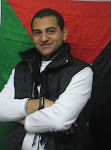Ayman is currently an intern in UNESCO’s Education Sector, working with and learning about post-conflict post-disaster education as part of a Master’s degree in peace studies. “I believe in the importance of education for transforming societies and resolving conflicts,” he says. “I know this from experience.”
After completing his primary and secondary education in UNRWA schools, and graduating in 2008 from the English programme of the Islamic University of Gaza (Palestinian Authority), Ayman became first a teacher, then a humanitarian worker. “I was Child Welfare Programme Officer with a number of international NGOs,” he explains. “During this time Ayman started blogging about daily life in Gaza. His main ambition, however, was to travel abroad and pursue peace studies. The blog and his social network ultimately made that possible.
Ayman was interested in the International Master’s degree in Peace, Conflict and Development Studies (or “Peace Master”) which is one of the activities of the UNESCO Chair of Philosophy for Peace at the Jaume I University in Castellón, Spain. He applied for a scholarship financed by the Bancaja-Caja Castellón Foundation and was accepted for the session from February 2010 to May 2012.
With the help of a go-between – an Israeli friend he had met online, who benefited from greater mobility than he – Ayman obtained a Spanish student visa. Once his papers were in order, he booked a flight for 1 February 2010. However, like several hundred other scholarship students, he was prevented from leaving Gaza. The Master’s degree programme began without him.
Having tried and failed to get support from official channels (embassies, NGOs such as Amnesty International, even the European Parliament), he turned to social networking. The week before he was due to start his studies, Ayman posted an article on his blog called “I have a dream” recounting his difficulties with the Israeli authorities in trying to leave Gaza. “It was non-accusatory,” he explains”. I was just asking for the basic right to pursue an education.” He ended the article with the sentence: “I am appealing and calling lawyers, politicians, journalists and all activists for human rights to join the fight for me and my right to the education that I have always dreamed of.”
The response was overwhelming: Ayman’s online friends translated his appeal into English, Spanish, French, Catalan and Hebrew. It was picked up by bloggers everywhere. A Facebook campaign was launched and acquired 1000 followers while an online petition gathered almost 2000 signatures in the first week, many from Israel. Ayman had become a cause célèbre.
“Social networking helped me realize my right to education,” Ayman claims. Following the international mobilization Ayman finally received his permission to travel. He arrived in Spain one week late for class. At the Jaume I University, he is taking several courses on aspects of human rights education, peace education and conflict transformation. “It is a very healthy environment where I am also being educated in mulitculturality,” he says. “Thanks to these courses I have became more aware about different conflicts taking place around the world.” Ayman also shared first-hand experience with people who have lived in conflict situations. “It assured me that conflicts are the same everywhere, and that humanity is humanity wherever we are.”
Ayman recently visited Austria to study UN Peacekeeping. This was part of his Master’s degree, as is his current internship in UNESCO. He is frequently invited to give conferences and is now writing a project proposal targeting youth in Arab countries. The title? “How to use social networking to promote human rights education in the Arab world.”





1 comment:
mesin fotocopy
rental sound
rumah dijual
perlengkapan bayi
toko bunga
bengkel mobil
party organizer
Post a Comment